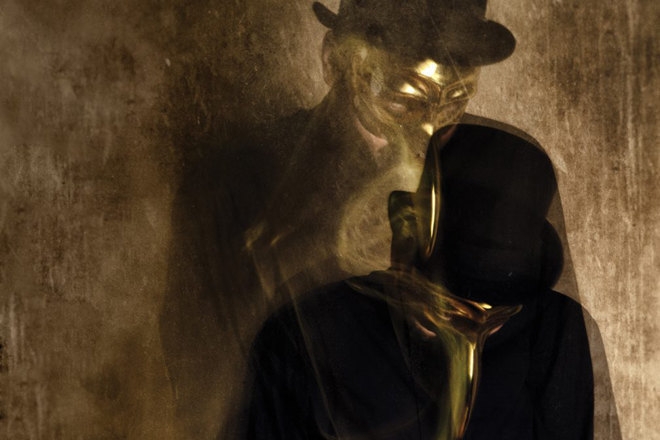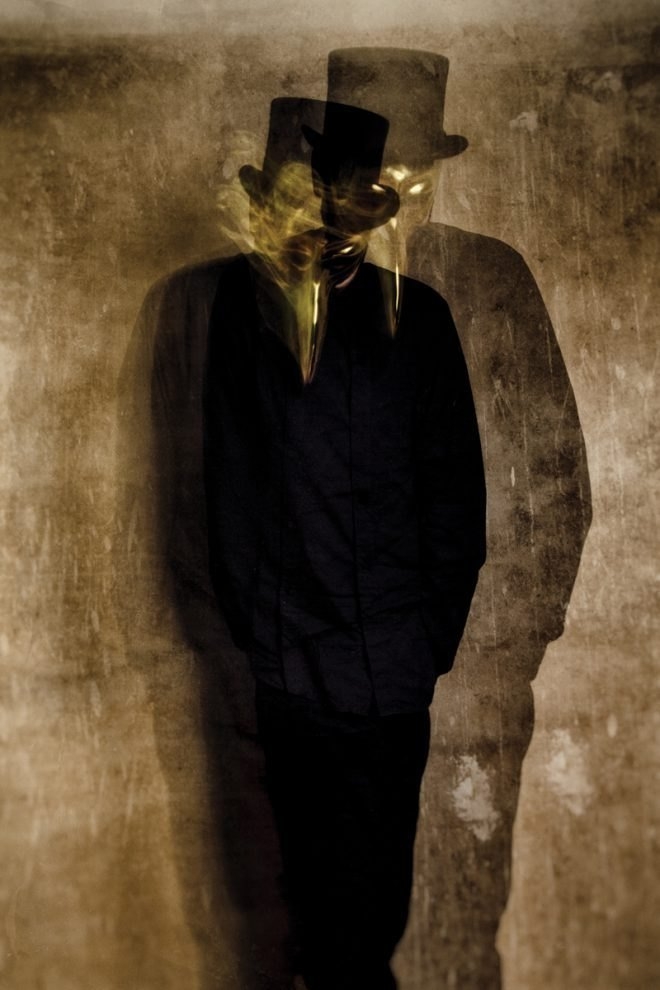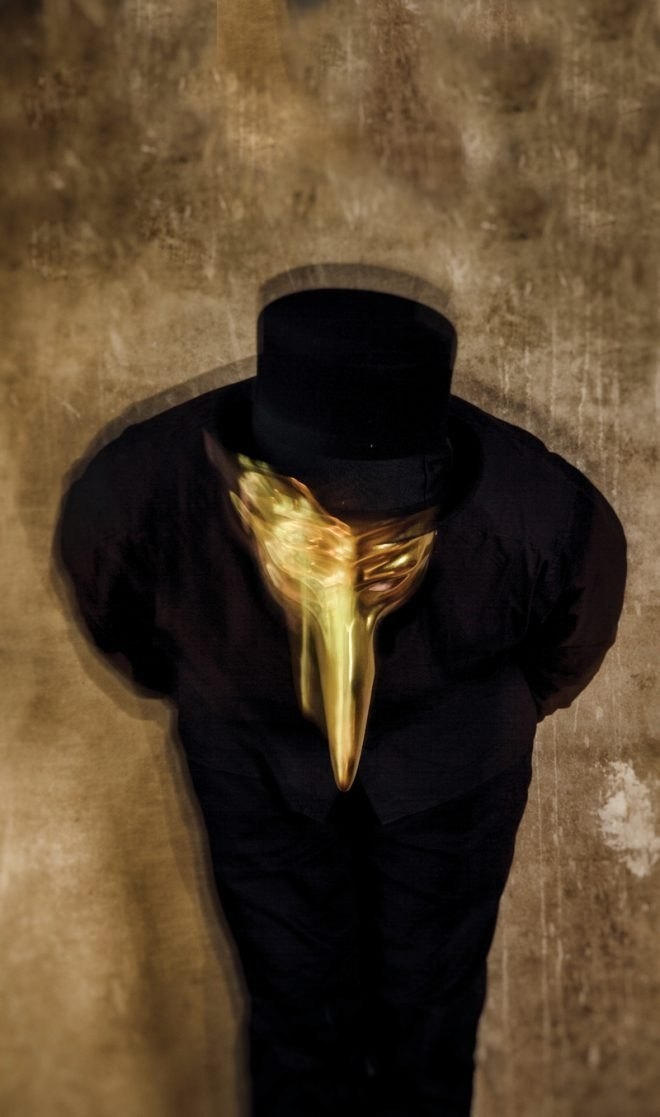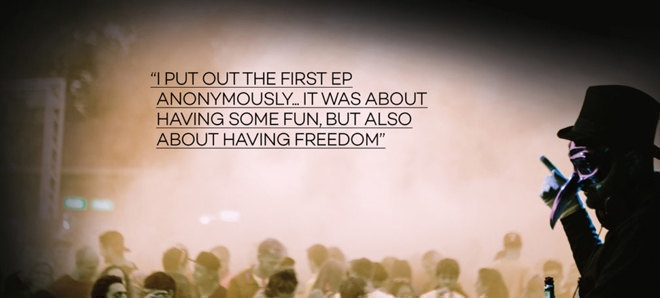Claptone: Through a mask darkly
We took a trip inside the strange, mysterious world of Claptone

"Dear Mortal," reads the paper scroll. "Welcome to the world of Claptone. Your journey here is to discover more about me. But be prepared, we both might share more than we intend. My friends will take you to me. You should be able to trust them…"
The scroll – wrapped in a bright red ribbon and embedded in the wall of a medieval cloister in Berlin along with a gold, 'plague doctor'-style Venetian mask – is the first stage in an interview process that's about to get even more interesting.
The musical entity known as Claptone is fiercely protective about his identity, keeping his mask on during DJ and live shows, for interviews and – rumour has it – even during sex. In fact, today represents the mystery man's first ever face-to-face chat with the media. Or it would, if we were going to actually see his face – which, from the look of the blindfold swinging from his smiling assistant's hand as we re-enter the black van that brought us here, isn't likely. "It's for the best," she says, covering my eyes.
The irony of the fact that the van is playing his 2013 smash 'No Eyes' is not lost on us as we settle back and reflect on the producer's rapid trajectory from relative obscurity to one of the most visible characters in the global deep house scene. The chugging, woozy sounds spilling from the stereo – the Wu-Tang Clan-sampling 'Cream', the Dre-sampling 'Wrong', 'Ghost' (featuring Clap Your Hands Say Yeah's Alec Ounsworth) – underline Claptone's almost mystical ability to make house that's crisply produced and effortlessly infectious.
It's easy to picture him in the studio, bedecked in a top hat and white gloves and waving a magic wand around like a (sha)manic orchestra conductor, but just as we start to relax the music is turned down, the van stops and the door slides open. We're helped out and steered through several doors, around multiple corners and down steps until we reach what smell like some dank tunnels, then come to an abrupt halt. There's a knock on a door and a deep voice says, "Come in." Inside, we're allowed to remove the blindfold. We're in a tiny, dark, brick cellar lit by a couple of candles. One is on a table next to an empty chair. The other illuminates, very faintly, the seated, gold-masked man on the other side of the table. We're face-to-beak with the man himself. "Well done for making it through the labyrinth," he says, gesturing towards the empty chair with a white-gloved hand. "Please, take a seat."

As the door behind us closes and water pipes gurgle gently above our heads, we feel compelled to ask about the obsession with his identity. Is it a game? Is it serious? "Both," he says, a trace of German audible in his otherwise impeccable English. "I put out the first EP anonymously because I was making other music at the time and wanted to do something different without being labelled or having to represent it individually. It was about having some fun, but also about having the freedom to do what I wanted. By the time I released 'Cream' I was getting requests for DJ sets, which meant stepping out of the darkness. That's when I became Claptone and began using the mask."
Concealing one's identity is of course nothing new. From Burial and Moodymann to Daft Punk and Red Shape, many have opted (or at least tried) to keep their real-life mugs under wraps. Yet Claptone doesn't associate himself with that lineage. "I don't really see any divide between, say, Red Shape and someone like Michael Jackson, who had plastic surgery in order to create his own kind of mask. Everyone wears a mask, and as people get more famous they tend to want to do so even more. If I am part of a tradition in dance music it might be one that's more theatrical, for example an act like Devo, which always dressed up and generated their own imagery."
Given the mask, it's impossible to tell how old Claptone might be, though the lack of white hairs in his black beard suggests the "around 100 years old" claimed in previous interviews may be an exaggeration. It's obvious that he's experienced behind the decks and has diverse musical influences. Maybe asking about his musical past will yield some clues...
"Many artists like to distinguish between different styles and I can see how people need those signposts to help navigate through the world of music. But to me the divisions have always been irrelevant. Whether it's Einstürzende Neubauten or birds in fields, I try to inhale everything and let it inspire me. As for Claptone, it's built on the foundations of house and club music, but adds a certain organic feel. It tries to not be too synthetic. It tries to be human and ultimately touch people. But this is a personal preference at the moment, to be working more with soul, hip hop and funk. It moves my own feelings and I try and translate and even deform that. It seems to do the trick."
While some Claptone tracks have been about the hedonistic side of house, all slick bass grooves, shiny hooks and catchy handclaps, others have shown a deeper, more pensive side– in particular, vocal tracks like 'No Eyes' and 'Ghost'. Both feature on the producer's classy debut album, 'Charmer', alongside many others that marry the melancholy and merriment of great songwriting with the driving euphoria of soulful house. One example is the recently released 'Puppet Theatre', featuring Peter, Bjorn and John, which expands house into the realm of political critique while maintaining a danceable groove.

Other album guests include Boxer Rebellion's Nathan Nicholson, Young Galaxy, Finnish renegade Jimi Tenor, Jay-Jay Johanson and several tracks with JAW. With 11 of the 13 tracks featuring vocals, it clearly aims to transcend any predictable collection of club classics. Claptone nods in agreement, his beak shimmering enigmatically in the candlelight. "For me, it could never be compilation in that sense. Either you do an album, with compositions that relate to each other, that have a certain order, and that are not only made for the club, or you do an EP or a single. I wanted to do something that you can listen to at home as well."
The album is certainly lyrically deep enough for home listening, with lyrics about love, loss, consumerism and the illusory nature of the world. The track that gave him faith to make an album, he says, was 'No Eyes', a b-side and full-on vocal track that blew up way beyond his expectations. "I thought, if that can happen, then it's possible. So I sent about a hundred emails to artists who I personally like and respect, and what I got back is what's on the album. Obviously that's not a huge percentage, probably because my profile was not at the right level, or they were too busy. But what I did get back blew me away. They all felt like perfect choices with lyrics I totally subscribe to."
While he might not have seduced everyone he wanted to onto the album, Claptone's steadily expanding remix catalogue certainly includes some heavyweights. The Pet Shop Boys, Faithless, Hurt and Metronomy are all on there, and his recent remake of Gregory Porter's 'Liquid Spirit' has become a Beatport bestseller and one of the biggest tunes of the year. Porter himself remarked that he "could not argue with the success of the Claptone remix. Working with him is like a jazz collaboration. He took the inspiration from my song and reconfigured and elaborated on it, which is exactly what you do in jazz."
"I tend to select the remixes on the basis of how the artist might connect with my own musical world view and whether they have something to say, lyrically or musically," explains Claptone. "If I can feel some soul and funk in a track then I feel I can touch the original. Remixing only club music would be boring, which is why I like to branch out. Gregory actually came to me some years ago about a remix but I had so much respect for him that I said no. This year I felt I would try. Remixing this kind of music can easily go wrong, but then again the principles of both genres – organic soul and organic house – are connected to me."

A knock on the door of our basement retreat – which has grown quite cosy, if not romantic, over the last hour – indicates that our time is up. The blindfold is back until we exit the building, then we're driven to the outskirts of the city for a Stil Vor Talent open-air party where, an hour later, Claptone hits the decks dressed in trademark top hat, mask and gloves. The Berlin crowd, up for it as ever, groove in the late afternoon sunshine to tracks like Superlover's 'Love Machine' and Rene Amesz's 'Big', woven into a succession of Claptone tunes and unreleased remixes like Disclosure's 'Omen' and Rudimental's 'I Will For Love'.
It's just one of around 200 sets and live shows Claptone has performed in the last year, and there are more coming up. Not only is Claptone somehow able to meet this punishing schedule head-on, he also has the magical ability to be DJing in two entirely different countries on the same night. We call him after the show to find out more. "DJing just feels really good for me," he says. Oddly, his voice sounds different and his English slightly less fluent, which we put down to the transformative effect of the sun – or perhaps the vodka. "I love to build a relationship with the crowd and I love to play my own music, especially before it's released as you get to see the reactions first hand."

Although most of Claptone performances are DJ sets, a live performance has been carefully developed and road-tested in the last year with the help of Oscar-nominated film-maker Peter Martin (Gorillaz, Banksy's Exit Through The Gift Shop). Called Immortal Live, the show features elements of the past and the future, and is open – as might be expected – to interpretation.
"The live show needs a big team to bring it onto the stage, so we usually play it at festivals as they have the big lights and LED walls," explains Claptone. "The general direction of such shows, especially in the EDM scene, is to be more colourful, more exciting, but we've tried to slow things down a bit and develop a story. We even start off in black and white."
There's one more question to be asked. The album's title, 'Charmer' – where does it come from? There's a pause during which we're sure we can hear another voice, maybe several, maybe even hundreds, chuckling in the background. "It's because I'm a genuinely charming person. Not only do I open normally locked doors, but I put a spell on people too…"
Claptone 'Charmer' is out now on Different Recordings


